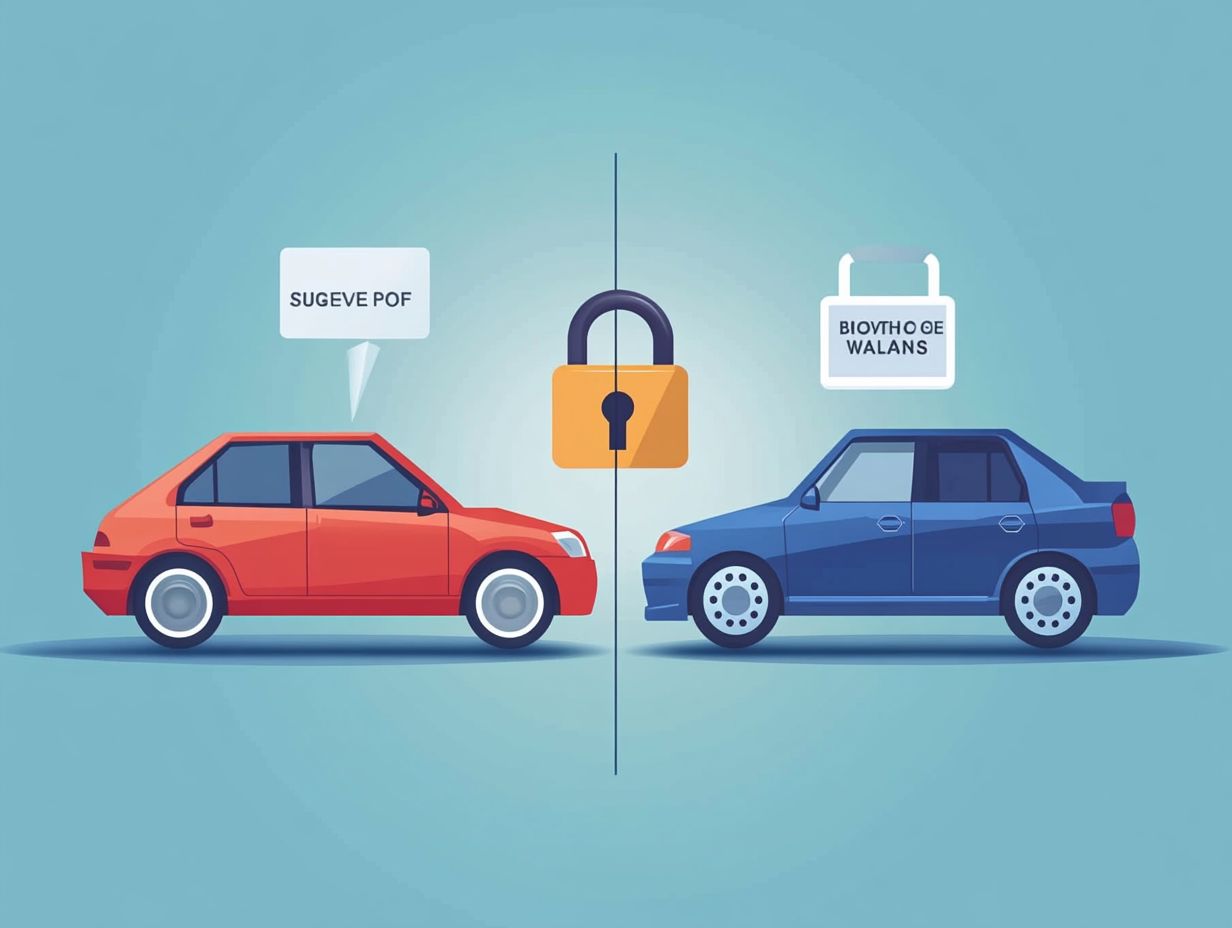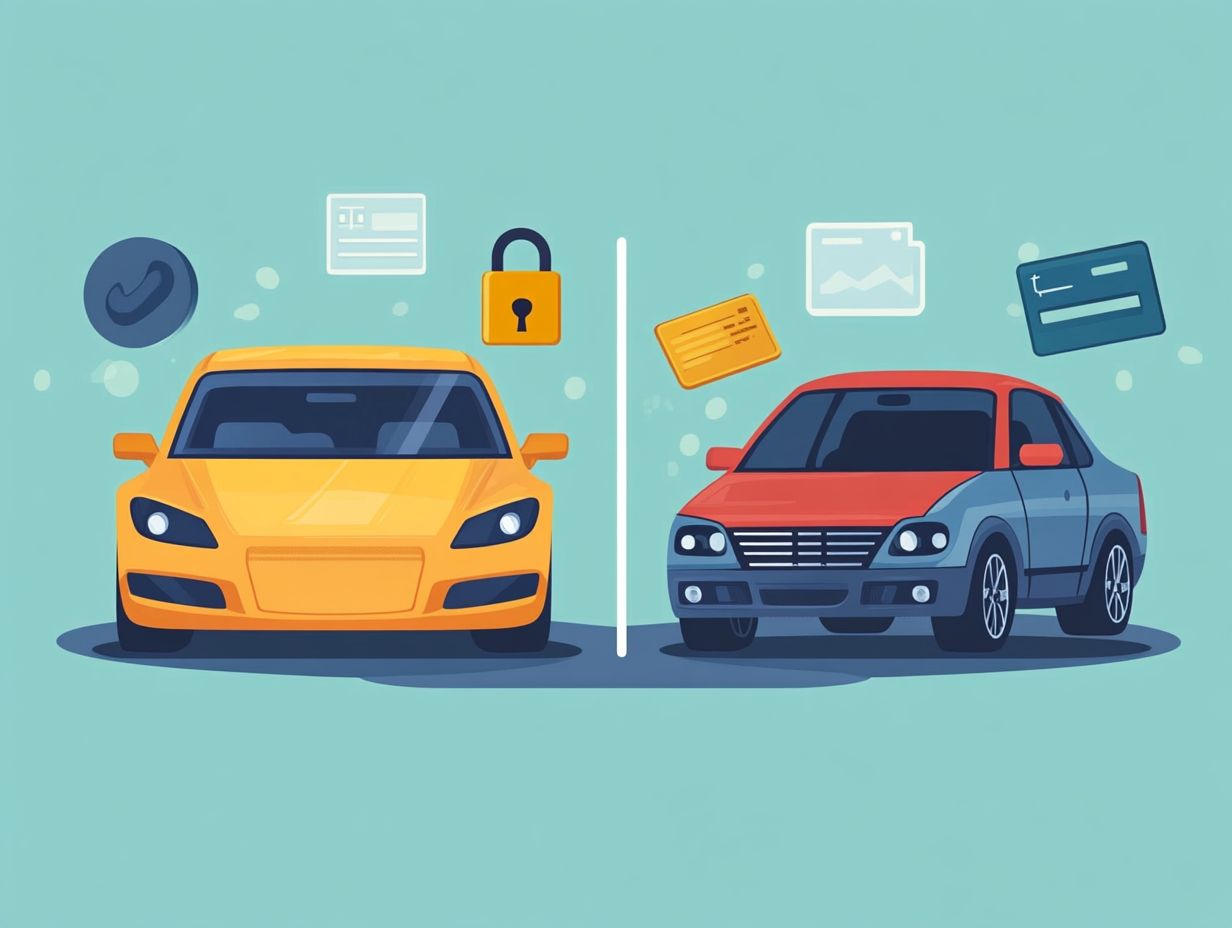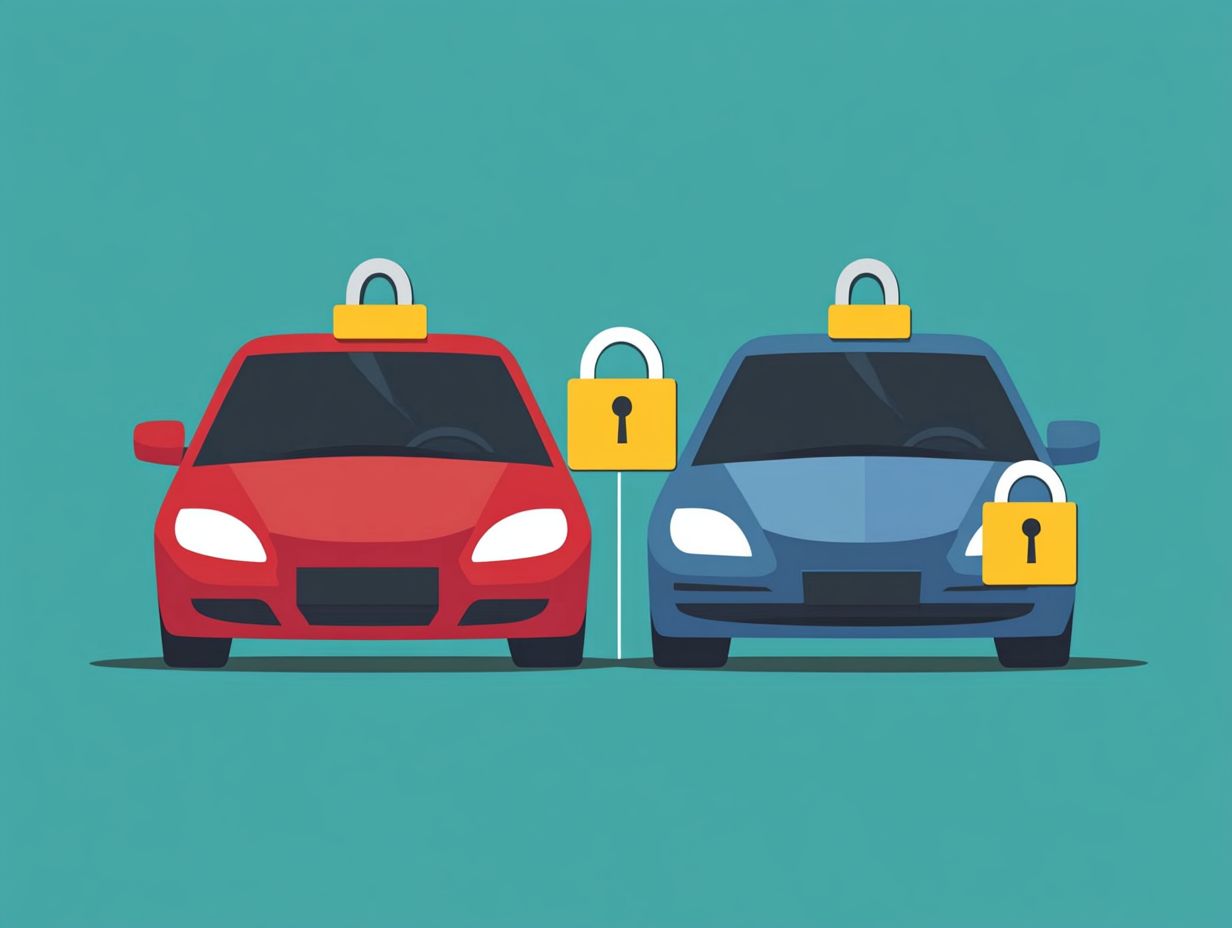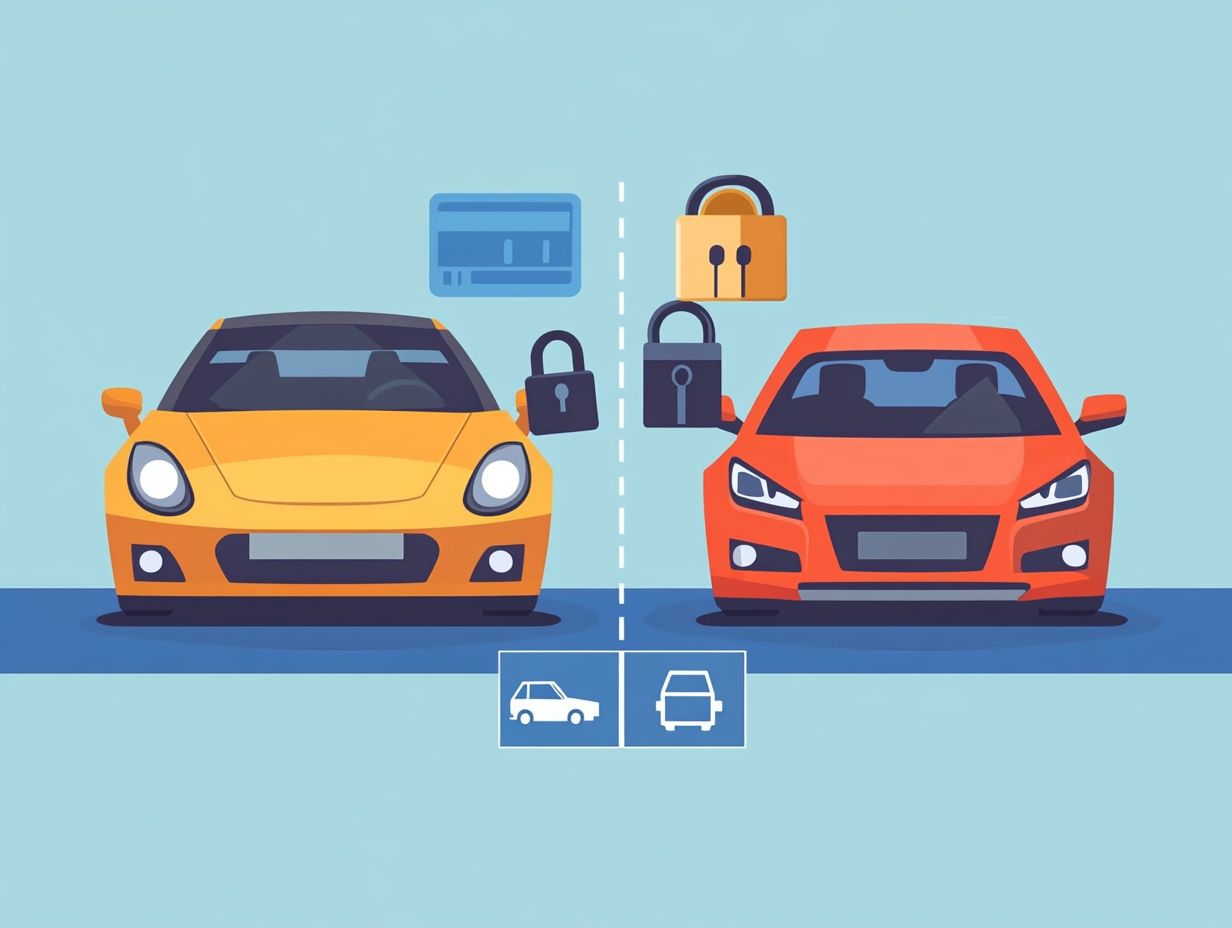Understanding Secured vs. Unsecured Car Loans
Navigating the world of car loans can feel daunting, especially with various options like secured and unsecured loans. Each type has its own advantages and drawbacks, making it crucial for you to understand their differences.
This article will clarify what car loans are, discuss the pros and cons of secured and unsecured options, and highlight key factors to consider before making a decision. This article includes tips to help you qualify for a car loan, ensuring you’re well-prepared for your next vehicle purchase.
Let s dive in and find the perfect loan for your financial goals!
Contents
- Key Takeaways:
- Secured vs. Unsecured Car Loans
- Pros and Cons of Secured Car Loans
- Pros and Cons of Unsecured Car Loans
- Key Factors in Choosing Your Car Loan
- Interest Rates, Credit Score, and More
- How to Qualify for a Car Loan
- Requirements and Tips for Approval
- Frequently Asked Questions
- What is the difference between a secured and unsecured car loan?
- What types of car loans are considered secured?
- What types of car loans are considered unsecured?
- What are the pros of getting a secured car loan?
- What are the pros of getting an unsecured car loan?
- Are there any risks associated with secured car loans?
Key Takeaways:

- Secured car loans offer lower interest rates and longer repayment terms but require collateral.
- Unsecured loans do not need collateral but typically have higher interest rates.
- Consider interest rates, credit score, and loan requirements when choosing a loan.
What are Car Loans?
Car loans are financial products designed to simplify your vehicle purchase experience, allowing you to buy a car without the burden of immediate full payment.
These loans help you manage your finances effectively by spreading the cost of the vehicle over a set timeframe with manageable monthly payments, tailored to fit various borrowing amounts and individual credit profiles.
These financing options come in different forms, including secured and unsecured loans, each accommodating various financial situations and preferences.
For many, a car loan is a vital tool that enables the purchase of a new or used vehicle while helping you maintain your cash flow for other expenses.
Interest rates for these loans can fluctuate based on factors like credit scores and loan terms, impacting the overall cost.
It s crucial to evaluate these elements carefully, as making the right choice in a car loan can significantly affect your budget and long-term financial health.
Secured vs. Unsecured Car Loans
When exploring financing options for your vehicle purchase, it’s essential to understand the differences between secured and unsecured car loans, as each presents its own set of benefits and risks.
Secured car loans often require collateral usually the vehicle itself which can lead to lower interest rates. However, this also increases the risk of repossession if payments are missed.
On the other hand, unsecured loans do not require collateral, but they typically carry higher interest rates and present greater risk for the lender. Making an informed choice can significantly impact your financial journey.
Explanation of Each Type
Secured car loans are backed by collateral typically the vehicle you re purchasing. This security allows lenders to offer lower interest rates and more favorable loan terms, making these loans popular for individuals with solid credit.
In contrast, unsecured car loans don t require collateral, giving you greater flexibility, but they often carry higher interest rates due to the increased risk for lenders.
If you re considering a secured loan, you can generally expect terms that range from three to five years, with interest rates typically between 4% and 7%, depending on your creditworthiness. This option is especially beneficial if you have a strong credit history and want to keep your monthly payments low.
Conversely, unsecured car loans generally have shorter terms, often lasting two to four years, with interest rates that can exceed 10% or more. This makes them more suitable for individuals facing credit challenges or those who prefer not to tie their vehicle to a loan agreement.
Understanding these nuances empowers you to make informed decisions tailored to your financial situation and long-term goals.
Ready to find the right car loan for you? Start exploring your options today!
Pros and Cons of Secured Car Loans

Secured car loans present a range of advantages, including lower interest rates and the possibility of larger loan amounts due to the collateral backing them.
However, they also have notable disadvantages, primarily the risk of repossession if you fail to meet your repayment obligations. Losing your vehicle is a serious concern that needs careful consideration.
As a borrower, it’s essential to evaluate the benefits of reduced interest rates against the potential consequences of default.
Advantages and Disadvantages
The primary advantages of secured car loans include lower interest rates and increased lender confidence. This can lead to more favorable loan terms and larger borrowing amounts.
It’s important not to overlook the associated disadvantages, such as the risk of losing your vehicle and tougher rules for the loan. Understanding these factors is essential for making informed financial decisions.
You can save money with lower rates that secured loans typically offer. Lenders often view them as less risky due to the collateral involved, empowering you to negotiate better terms.
This enables you to finance your vehicle without excessively straining your budget. However, failing to meet repayment obligations could lead to repossession, which is a serious risk to consider.
Securing these loans often requires tougher credit checks and income verification processes, which can be intimidating for some individuals.
Pros and Cons of Unsecured Car Loans
Unsecured car loans come with a unique mix of advantages and disadvantages that you should consider thoughtfully.
On one hand, they provide greater flexibility and don t require collateral, allowing you to avoid the risks associated with repossession.
On the other hand, they often carry higher interest rates and have tougher credit score needs, making them less accessible for some borrowers. Weighing these factors carefully is crucial for making informed financial decisions.
Advantages and Disadvantages
The benefits of unsecured car loans are appealing, offering you the freedom of payment flexibility without the need for collateral. This can be particularly empowering for those with less-than-perfect credit, allowing you to secure financing when other options may be limited.
However, this convenience often comes at a cost higher interest rates and potentially lower loan amounts compared to secured loans.
For individuals who may not own a home or possess significant assets, an unsecured car loan opens the door to vehicle ownership. The ability to customize your payment plans adds convenience, enabling you to tailor your repayments to fit your budget.
Yet, this increased accessibility is not without risks. You might face steep monthly payments that could strain your finances over time. The absence of collateral typically leads lenders to impose higher interest rates, which can result in significant overall costs, especially if the loan term is extended.
It s crucial to weigh these factors carefully before making a commitment.
Key Factors in Choosing Your Car Loan

Before you select a car loan, it’s essential to evaluate several key factors, including interest rates, credit score requirements, and the various loan options available.
Each of these elements plays a significant role in your overall financial decisions and the loan’s suitability for your unique needs. By understanding these factors thoroughly, you can make better borrowing choices and potentially save money in the long run.
Interest Rates, Credit Score, and More
Interest rates and credit score requirements are crucial factors that directly affect your car loan applications. They determine not only the cost of borrowing but also the types of loans available based on your credit background.
Understanding these elements is vital for optimizing your borrowing history and securing the best financing terms. Your credit score reflects your financial responsibility, influencing the interest rates you might receive and the entire approval process.
Generally, higher credit scores lead to lower interest rates, making loans more affordable. In contrast, lower scores may result in higher costs or limited options.
In this ever-evolving marketplace, be astute in evaluating your credit health, exploring various lenders, and considering alternative financing routes. Taking these steps enables you to make informed decisions that align your financial goals with the most favorable loan terms.
How to Qualify for a Car Loan
To qualify for a car loan, know what lenders look for. A clear understanding of specific criteria and meticulous preparation of necessary documentation can help assess your ability to pay back a loan.
Familiarizing yourself with these qualifications positions you for successful loan approval and helps secure better terms.
Requirements and Tips for Approval
The requirements for car loan approval typically include submitting a loan application that evaluates your ability to pay back the loan, along with documentation highlighting your income, employment, and any potential loan fees associated with borrowing amounts.
As a prospective borrower, gather key documents, such as recent pay stubs, tax returns, and bank statements, to showcase your financial stability.
It’s advisable to create a budget that outlines your monthly expenses. This helps determine a reasonable loan amount and ensures your repayments remain manageable.
Enhance your chances of approval by obtaining pre-approval. This gives you insight into available loan options and establishes a clear budget.
Minimize unnecessary expenses before applying to help reduce outstanding debt, positioning yourself as a more reliable financial partner in the eyes of lenders.
Frequently Asked Questions

What is the difference between a secured and unsecured car loan?
A secured car loan requires collateral, usually the car itself, while an unsecured car loan does not require collateral. In a secured loan, the lender can repossess the car if the borrower fails to make payments. An unsecured loan may have higher interest rates and stricter eligibility requirements.
What types of car loans are considered secured?
Common secured car loans include traditional auto loans from banks or credit unions and loans from dealerships that use the car as collateral. The lender has a legal claim on the car until the loan is fully paid off.
What types of car loans are considered unsecured?
Unsecured car loans typically come from online lenders, peer-to-peer lending platforms, or personal loans from banks or credit unions. These loans do not require collateral, but they may have higher interest rates and stricter eligibility requirements.
What are the pros of getting a secured car loan?
Secured car loans often come with lower interest rates, as the lender has some security in case the borrower defaults. They may also be easier to qualify for, making them a good option for those with lower credit scores.
What are the pros of getting an unsecured car loan?
Unsecured car loans do not require collateral, so borrowers don t have to worry about the lender repossessing their car if they cannot make payments. They often come with more flexible eligibility requirements and faster application processes compared to secured loans.
Ready to secure the best car loan? Start your application today!
Are there any risks associated with secured car loans?
Yes, secured car loans come with risks. If you miss a payment, the lender can take back your car.
This can hurt your credit score and lead to a loss of personal property. If the car’s value is less than what you owe, you will still have to pay the difference.






